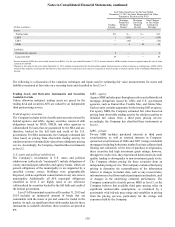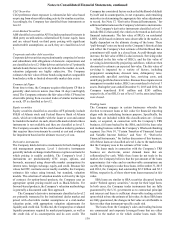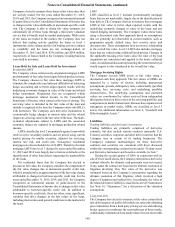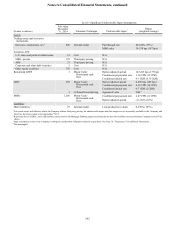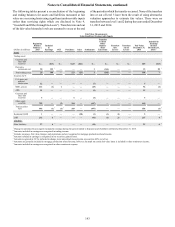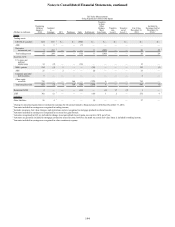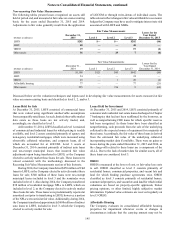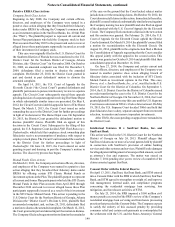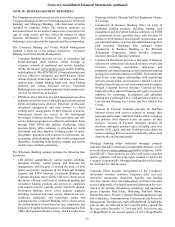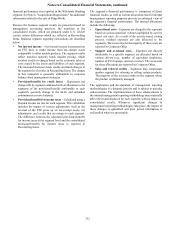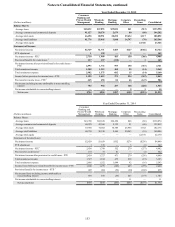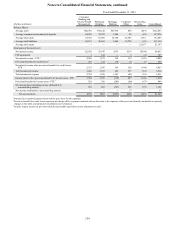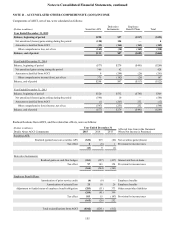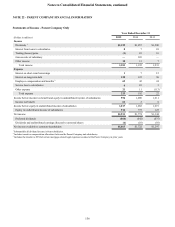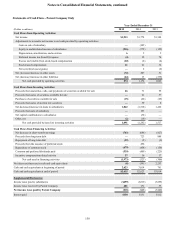SunTrust 2015 Annual Report Download - page 176
Download and view the complete annual report
Please find page 176 of the 2015 SunTrust annual report below. You can navigate through the pages in the report by either clicking on the pages listed below, or by using the keyword search tool below to find specific information within the annual report.Notes to Consolidated Financial Statements, continued
148
NOTE 19 – CONTINGENCIES
Litigation and Regulatory Matters
In the ordinary course of business, the Company and its
subsidiaries are parties to numerous civil claims and lawsuits
and subject to regulatory examinations, investigations, and
requests for information. Some of these matters involve claims
for substantial amounts. The Company’s experience has shown
that the damages alleged by plaintiffs or claimants are often
overstated, based on unsubstantiated legal theories, unsupported
by facts, and/or bear no relation to the ultimate award that a court
might grant. Additionally, the outcome of litigation and
regulatory matters and the timing of ultimate resolution are
inherently difficult to predict. These factors make it difficult for
the Company to provide a meaningful estimate of the range of
reasonably possible outcomes of claims in the aggregate or by
individual claim. However, on a case-by-case basis, reserves are
established for those legal claims in which it is probable that a
loss will be incurred and the amount of such loss can be
reasonably estimated. The Company's financial statements at
December 31, 2015 reflect the Company's current best estimate
of probable losses associated with these matters, including costs
to comply with various settlement agreements, where applicable.
The actual costs of resolving these claims may be substantially
higher or lower than the amounts reserved.
For a limited number of legal matters in which the Company
is involved, the Company is able to estimate a range of reasonably
possible losses in excess of related reserves, if any. Management
currently estimates these losses to range from $0 to
approximately $170 million. This estimated range of reasonably
possible losses represents the estimated possible losses over the
life of such legal matters, which may span a currently
indeterminable number of years, and is based on information
available at December 31, 2015. The matters underlying the
estimated range will change from time to time, and actual results
may vary significantly from this estimate. Those matters for
which an estimate is not possible are not included within this
estimated range; therefore, this estimated range does not
represent the Company’s maximum loss exposure. Based on
current knowledge, it is the opinion of management that
liabilities arising from legal claims in excess of the amounts
currently reserved, if any, will not have a material impact on the
Company’s financial condition, results of operations, or cash
flows. However, in light of the significant uncertainties involved
in these matters and the large or indeterminate damages sought
in some of these matters, an adverse outcome in one or more of
these matters could be material to the Company’s financial
condition, results of operations, or cash flows for any given
reporting period.
The following is a description of certain litigation and regulatory
matters:
Card Association Antitrust Litigation
The Company is a defendant, along with Visa and MasterCard,
as well as several other banks, in several antitrust lawsuits
challenging their practices. For a discussion regarding the
Company’s involvement in this litigation matter, see Note 16,
“Guarantees.”
Lehman Brothers Holdings, Inc. Litigation
Beginning in October 2008, STRH, along with other
underwriters and individuals, were named as defendants in
several individual and putative class action complaints filed in
the U.S. District Court for the Southern District of New York
and state and federal courts in Arkansas, California, Texas, and
Washington. Plaintiffs alleged violations of Sections 11 and 12
of the Securities Act of 1933 and/or state law for allegedly false
and misleading disclosures in connection with various debt and
preferred stock offerings of Lehman Brothers Holdings, Inc.
("Lehman Brothers") and sought unspecified damages. All cases
were transferred for coordination to the multi-district litigation
captioned In re Lehman Brothers Equity/Debt Securities
Litigation pending in the U.S. District Court for the Southern
District of New York. Defendants filed a motion to dismiss all
claims asserted in the class action. On July 27, 2011, the District
Court granted in part and denied in part the motion to dismiss
the claims against STRH and the other underwriter defendants
in the class action. A settlement with the class plaintiffs was
approved by the Court and the class settlement approval process
was completed. A number of individual lawsuits and smaller
putative class actions remained following the class settlement.
STRH settled two such individual actions. The other individual
lawsuits were dismissed. In two of such dismissed individual
actions, the plaintiffs were unable to appeal the dismissals of
their claims until their claims against a third party were resolved.
In one of these individual actions, the plaintiffs have filed a notice
of appeal to the Second Circuit Court of Appeals. Oral argument
in that appeal is expected to occur in 2016. In the other individual
action, no appeal has been filed.
Bickerstaff v. SunTrust Bank
This case was filed in the Fulton County State Court on July 12,
2010, and an amended complaint was filed on August 9, 2010.
Plaintiff asserts that all overdraft fees charged to his account
which related to debit card and ATM transactions are actually
interest charges and therefore subject to the usury laws of
Georgia. Plaintiff has brought claims for violations of civil and
criminal usury laws, conversion, and money had and received,
and purports to bring the action on behalf of all Georgia citizens
who incurred such overdraft fees within the four years before
the complaint was filed where the overdraft fee resulted in an
interest rate being charged in excess of the usury rate. The Bank
filed a motion to compel arbitration and on March 16, 2012, the
Court entered an order holding that the Bank's arbitration
provision is enforceable but that the named plaintiff in the case
had opted out of that provision pursuant to its terms. The Court
explicitly stated that it was not ruling at that time on the question
of whether the named plaintiff could have opted out for the
putative class members. The Bank filed an appeal of this
decision, but this appeal was dismissed based on a finding that
the appeal was prematurely granted. On April 8, 2013, the
plaintiff filed a motion for class certification and that motion was
denied on February 19, 2014. Plaintiff appealed the denial of
class certification and on September 8, 2015, the Georgia
Supreme Court agreed to hear the appeal.


